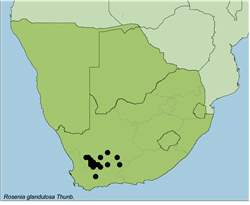Names and synonyms
Rosenia glandulosa Thunb.
Type
Thunberg Herb. No. 20091 (UPS-THUNB, SBT-BERG).
Common names
Klierbos
Derivation of names
Rosenia = after E. Rosen (1714-1796), Swedish physician, botanist and professor of practical medicine.glandulosa = glandular
Diagnostic characters
Linear ericoid leaves in fascicles or on short brachyblasts (except on flowering branches)Leaves woolly-hairy, with distinct midrib and with a few large sessile glands on the margins and midrib of young leavesYellow radiate capitulaCapitula terminalInvolucral bracts with a dark centre and broad membranous margins
Description
Shrubs 0.3-0.5 m tall, moderately and often subdichotomously branched, sometimes subspinescent. Leaves 2-10 x 0.5-2.5 mm, grey-hairy, glandular with stalked glands, flat to somewhat three-sided with a prominent midrib, linear to narrowly oblong. Capitula 12-25 mm diameter. Involucre 3-15 mm wide, bell-shaped. Involucral bracts dark brown in the middle, with papery, translucent margins. 25-50, outer ovate-oblong, inner gradually longer and oblong-obovate, basally firm and yellowish brown, upper displayed part spreading, thin and papery, with a dark brown middle stripe and wide, pale, scarious margins, up to 12 mm long, up to 4 mm wide. Receptacle paleate and sometimes also shortly squamose. Paleae subtending all or occasionally only outer disc florets, 7-12 mm long. Ray florets 5-18, lamina elliptic, 5.5-12 mm long. Disc florets 12-55. Corolla 4.5-6.8 mm long. Pappus crownlike, of � connate scales, up to 2 mm long, almost always also with 1-4, 4.5-7 mm long, barbellate bristles. Cypsela terete or somewhat angular, narrowly oblong, 3.5-5.5 x 0.7-l.2 mm, mostly glabrous and smooth.
Flowering time
Mainly from August to September.
Distribution
Occasionally found in the Nieuwveld and Roggeveld mountain ranges around Sutherland and Middlepost up to the Hantam mountains at Calvinia. Known from about 35 specimens.
Habitat
Often in stony karoo veld on lower mountain slopes, onridges, usually on clayey soils.
Notes
This species is characterized by its involucre with thin and papery, brown and white bracts. The receptacle is generally paleate.It is easily mistaken for R. humilis, but the bracts of the flowerheads differ.
References
BREMER, K. 1976. The genus Rosenia (Compositae). Botaniska Notiser 129: 97-111. GLEN, H.F. 2004. SAPPI, What's in a Name? The Meanings of the Botanical Names of Trees. Jacana.POWRIE, L. 2004.Common names of Karoo Plants. Strelitzia 16. National Botanical Institute.SHEARING, D. 1994. Karoo. South African Wild Flower Guide 6. Botanical Society of South Africa.VLOK, J. & SCHUTTE-VLOK, A L. 2010. Plants of the Klein Karoo. Umdaus Press

_sml.jpg)